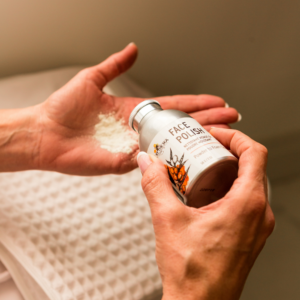Polishing your face at home can be a simple and rewarding way to enhance your skincare routine. By incorporating effective methods into your regimen, you can achieve a radiant complexion without the need for expensive salon treatments. This article explores various techniques and tips for achieving a polished and glowing face right from the comfort of your home.

Understanding Facial Polishing
Facial polishing involves removing dead skin cells and impurities to reveal a fresher, smoother complexion. It’s a crucial step in maintaining healthy skin and can be performed using a variety of methods. By understanding the basics of facial polishing, you can choose the best approach for your skin type and needs.
Why Facial Polishing Matters
Facial polishing offers numerous benefits, including:
- Smoother Skin: By removing dead cells, your skin feels softer and looks more refined.
- Enhanced Radiance: A polished face reflects light better, giving you a natural glow.
- Improved Product Absorption: Exfoliated skin absorbs skincare products more effectively, maximizing their benefits.
Choosing the Right Method
Several methods are available for polishing your face at home. The key is to select one that suits your skin type and concerns. Common techniques include:
- Physical Exfoliation: Using scrubs or brushes to manually remove dead skin cells.
- Chemical Exfoliation: Applying products containing acids like alpha-hydroxy acids (AHAs) or beta-hydroxy acids (BHAs) to dissolve dead cells.
- Enzyme Exfoliation: Utilizing natural enzymes from fruits to break down dead skin cells gently.
Physical Exfoliation Techniques
Physical exfoliation involves the use of scrubs or tools to slough off dead skin cells. This method can be highly effective but requires careful selection of products to avoid irritation.
Selecting the Right Scrub
When choosing a facial scrub, consider the following:
- Granule Size: Opt for scrubs with fine, rounded granules to prevent micro-tears in the skin.
- Ingredients: Look for soothing ingredients like aloe vera or chamomile to reduce potential irritation.
- Frequency: Limit use to 1-2 times per week to avoid over-exfoliation.
How to Use a Facial Brush
Facial brushes can enhance the exfoliation process. To use:
- Wet your face and brush with lukewarm water.
- Apply a gentle exfoliating cleanser to your face.
- Use the brush in circular motions, avoiding delicate areas like the eyes.
- Rinse thoroughly and follow with a moisturizer.
Enzyme Exfoliation Techniques
Enzyme exfoliants use natural fruit enzymes to gently exfoliate the skin. They are a great option for those with sensitive or reactive skin.
Popular Enzyme Ingredients
- Papaya: Contains papain, which breaks down dead skin cells.
- Pineapple: Contains bromelain, known for its exfoliating properties.
How to Use Enzyme Exfoliants
- Apply the enzyme product to clean, dry skin.
- Leave it on for the recommended time.
- Rinse off with lukewarm water and pat dry.
Post-Polishing Skincare Routine
After polishing your face, it’s crucial to follow up with a proper skincare routine to keep your skin healthy and hydrated.
Hydrating Your Skin
Use a gentle moisturizer to restore hydration and protect your skin barrier. Look for products with ingredients like hyaluronic acid or ceramides.
Protecting Your Skin
Apply sunscreen daily to protect your freshly polished skin from UV damage. Choose a broad-spectrum SPF of at least 30.
